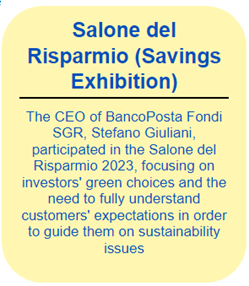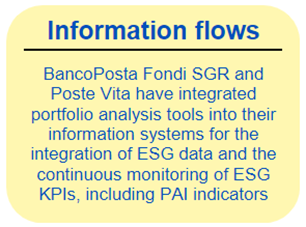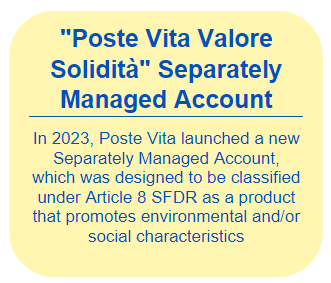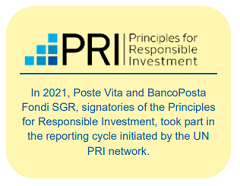For several years now, the Poste Italiane Group has adopted a responsible investment approach that accompanies BancoPosta Fondi SGR and Poste Vita in their investment activities. In fact, the Group applies the principles of sustainability1 in all its areas of operation, including the financial sector, firmly believing that the asset management and insurance sectors, through the integration of ESG factors into investment decision-making processes, can contribute to the generation of long-term sustainable value, helping to protect society, foster innovation and support economic growth.
The Bank of Italy, consistent with similar initiatives by the ECB and other national supervisory authorities, developed in 2022 a set of supervisory expectations on the incorporation of climate and environmental risks into business strategies, governance, control and risk management systems, and market disclosures by supervised intermediaries. The Bank of Italy followed this up with a thematic survey conducted on a sample of non-banking financial intermediaries. In view of the findings, all intermediaries were asked to prepare an 'Action Plan' by 31 March 2023, identifying the actions planned to address the gaps identified and ensure the alignment of business practices with supervisory expectations, specifying the priorities and timeframes required to complete the various initiatives.In response to the expectations expressed by the Bank of Italy, BancoPosta Fondi SGR has therefore defined its Action Plan on the integration of climate and environmental risks into business processes. The Plan was developed on the basis of the AMC existing situation at the beginning of 2023 and a gap analysis with respect to evidence from the survey conducted by the Bank of Italy. This Plan, approved by the Board of Directors of BancoPosta Fondi SGR and subject to the assessment of the Board of Statutory Auditors, is divided into five main development drivers: governance and organisational structure, corporate strategy, risk management system, reporting model and information flows, and remuneration policy. The Plan has a three-year horizon 2023 - 2025. The individual elements of the Plan, contained in each driver, are indicated through three levels of priority and associated with an indicative time horizon, which will be reviewed periodically to assess the feasibility of the Action Plan, also in accordance with changes in the context and regulations.
The definition of a holistic approach for the integration of sustainability considerations into the Group's investment activities is part of a path started in 2019 through the development of the strategies and the general responsible investment approach adopted by the Group's financial companies, BancoPosta Fondi SGR and Poste Vita. The first step along this path was the signing of the Principles for Responsible Investment (PRI) by both companies. These are six principles, adhered to by an extensive international network of investors, which promote the integration of ESG issues and the dissemination of responsible investment practices within their investments and portfolio companies, proposing a long-term vision in the interests of the signatories, the economy, the environment and society. Adherence to the PRI not only entails the integration of ESG criteria, but also results in a commitment by signatories to regularly report on their progress in implementing the responsible investment approach. This step is therefore consistent not only with the Group's perspective that the inclusion of ESG issues in investment processes is necessary to pursue long-term sustainable performance and reduce portfolio risk, but also with the principles of transparency and integrity in conduct. After a one-year suspension to allow for a review of its structure, the PRI questionnaire became active again in 2023 and both BancoPosta Fondi SGR and Poste Vita completed it in the planned reporting window.
 Among the aforementioned PRI principles, one of them includes the commitment to incorporate ESG issues in shareholder policies and practices; Poste Italiane considers the action of dialogue with the issuers in which Group companies choose to invest, and their involvement in initiatives dedicated to the management of sustainability aspects, a fundamental tool for the dissemination of sustainable development models and the achievement of the sustainability goals that the Group considers a priority. In line with this belief, in 2023, BancoPosta Fondi SGR and Poste Vita renewed their commitment to engagement as a pillar of ESG integration strategies in investment processes, participating in collaborative initiatives and dialogue with the financial sector, institutions and associations category, consistently with the Guidelines2 that regulate the exercise of voting rights and engagement activities by the two Companies. These Guidelines set out the specific methods and timing for BancoPosta Fondi SGR and Poste Vita to consider engagement actions in the event of investments in companies operating in sectors deemed sensitive to environmental issues - such as climate change - or social issues - such as human rights - or governance issues; at the same time, following a logic of prioritisation of the most significant issuers, the Guidelines also define the level of engagement priority for specific issuers.
Among the aforementioned PRI principles, one of them includes the commitment to incorporate ESG issues in shareholder policies and practices; Poste Italiane considers the action of dialogue with the issuers in which Group companies choose to invest, and their involvement in initiatives dedicated to the management of sustainability aspects, a fundamental tool for the dissemination of sustainable development models and the achievement of the sustainability goals that the Group considers a priority. In line with this belief, in 2023, BancoPosta Fondi SGR and Poste Vita renewed their commitment to engagement as a pillar of ESG integration strategies in investment processes, participating in collaborative initiatives and dialogue with the financial sector, institutions and associations category, consistently with the Guidelines2 that regulate the exercise of voting rights and engagement activities by the two Companies. These Guidelines set out the specific methods and timing for BancoPosta Fondi SGR and Poste Vita to consider engagement actions in the event of investments in companies operating in sectors deemed sensitive to environmental issues - such as climate change - or social issues - such as human rights - or governance issues; at the same time, following a logic of prioritisation of the most significant issuers, the Guidelines also define the level of engagement priority for specific issuers.With reference to Poste Vita an example to engagement activities is the REPower EU business letter, drafted by the University of Cambridge, and for which the Poste Vita Group is a signatory, that is a collaborative engagement initiative aimed at policy makers; this was conducted to delivering sustainable outcomes in the environmental sphere as it aims to request the European Commission to accelerate the energy independence plan and avoid new fossil fuel-based projects. In addition, the collaborative initiative PRI-led collaborative stewardship initiative on social issues and human rights also continued in 2023, which provides for dialogue with international companies on social issues and respect for human rights; specifically, the topics covered to delivering the aforementioned sustainability outcomes, and aimed at increase understanding of them, covered several macro-categories in the areas of full implementation of UNGPs, responsible political engagement, and additional company-specific expectations on human rights issues. Finally, during 2023 the Poste Italiane Group continued its commitment to the Climate Action 100+ engagement initiative, of which Poste Vita and Banco Posta Fondi SGR are signatories, followed up on the collaborative initiative to engage major carbon emitters globally in order to push them to implement concrete actions to reduce harmful emissions, thereby managing and mitigating ESG and financial risks.
 ESG Monitoring
ESG Monitoring
Vita make use of a timely and structured process for monitoring the investments in the portfolio, aimed at respecting the strategies applied, containing the risks associated with sustainability issues and evaluating opportunities to carry out engagement initiatives with the issuers in the portfolio. Thus, monitoring activities include the verification of exclusion criteria and exposures to sensitive sectors, the analysis of ESG profiles of portfolios, and the assessment of negative impacts generated on sustainability factors. Through the principles and processes adopted, the two Group companies can therefore monitor both the overall ESG profile of their investments as well as specific sustainability issues of a systemic nature (such as climate change and human rights), using in both cases assessments prepared by specialised and internationally recognised info-providers. To this end, the portfolios of BancoPosta Fondi SGR and Poste Vita are periodically analysed on an ESG level through an external service provider specialised in social and environmental issues to evaluate the degree of social responsibility and the carbon footprint, with the aim of mitigating any emerging risks. The info-provider's evaluations are carried out in accordance with internationally recognised and disseminated standards, guidelines and norms by organisations such as the UN, ILO and OECD. Offering investment products with environmental and social benefit.During 2023, Poste Italiane therefore continued its efforts to expand its proposal of financial products that promote environmental and/or social characteristics, with a view to channelling an ever-increasing amount of capital in favour of sustainable development and meeting the demands of savers and investors interested in the creation of positive social-environmental value through the investment products they subscribe to.

Thematic Funds
Between 2021 and 2022, BancoPosta Fondi SGR offered thematic products focused on the environment for placement, with the launch of BancoPosta Focus Ambiente 2027, which was followed by BancoPosta Focus Ambiente March 2028. The funds, managed under delegation by Anima SGR, invest primarily in third-party funds classified as products that promote environmental and/or social characteristics or that pursue a sustainability objective (within the meaning of the SFDR regulation), in particular focusing on sectors and economic segments related to environmental protection such as, for example, the circular economy, water management, blue economy, renewable energy and climate transition.
ESG funds of funds
As part of the ESG integration implemented by products consisting of fund of funds, BancoPosta Fondi SGR operates as an asset manager through flexible solutions based on the adoption of a specific proprietary model to support investment decisions. This product category includes the funds of BancoPosta Fondi SGR's Universo family. In 2023, BancoPosta Universo 40 and BancoPosta Universo 60 were joined by a third fund, Universo Tematico, which focuses its investments on three megatrends (planet, innovation, population) that are believed to be among the main drivers of future changes.

BEST-IN-CLASS FUNDS
This category includes those investment products of BancoPosta Fondi SGR, managed under delegation by third parties, for which a strategy is adopted aimed at selecting only issuers that respect certain acceptability thresholds, defined according to an ESG rating scale that can be developed by the delegated manager or by the reference info-provider chosen by the latter.
1) As such, the Group has established Responsible Investment Policies for both BancoPosta Fondi SGR and Poste Vita. The Responsible Investment Policy of Banco Posta Fondi SGR covers all the AuM. While, the Poste Vita Group's Responsible Investment Policy covers in terms of AuM 100% of active investments, 25% of passive investments and the total of externally managed assets (which represent 80% of AuM).
2) The share of AuM in terms of active investments to which the Poste Vita Group's Guideline on the Exercise of Voting Rights and Engagement Activities represents the totality of the same investments (100%); on the other hand, the share of AuM in terms of passive investments turns out to be 25%. With reference to BancoPosta Fondi SGR, the Guideline applies to the totality of AuM, with the exception of passive investments for which there is no exercise of voting rights.
3) During the fiscal year, direct exposure to equities is residual, with equities in the company’s financial statements representing about 0.3% of total assets.
- Guidelines for Investment in Sensitive Sectors BancoPosta Fondi SGR
- Guidelines For Exercising Voting Rights And Engagement Activity BancoPosta Fondi SGR
- Poste Vita Group: Guidelines for the investment in sensitive sectors
- Guidelines on the exercise of voting rights and engagement activities of the Poste Vita Group
- Gruppo Poste Vita’s Responsible Investment Policy
- Responsible Investment Policy of BancoPosta Fondi S.p.A. SGR


